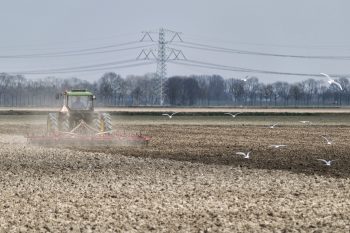Dutch Farmers are Upset at the Government Posted by Karoly Molina on Feb 12, 2020 in News
A few months ago, Sten wrote a post about the nitrogen crisis or the stikstofcrisis in the Netherlands and the effects on speed limit and the construction industry. In this post, I would like to focus on the Dutch farmers, how this crisis has affected farming and what the farmers and government have been doing about this situation.
Boerenprotest 2019
In an effort to verminderen or reduce nitrogen emissions, the government started making plans to cut the veehouderij or the animal husbandry sector. This sector is responsible for 46% percent of the nitrogen emissions in the country. This restriction would limit how much the farmers could produce. The farmers quickly made their sentiments made known to the overheid by protesting in Malieveld in The Hague on October 1st, 2019. Farmers from all over the country made their way to The Hague in their tractors causing chaos on the streets. In Malieveld, the green area near the station in The Hague that has become an unofficial protest site, the farmers parked their tractors and demanded that the government end plans to limit the sector. On October 14, the farmers staged their second protest, this time in their respective province offices demanding support. The protests continued in the last months of 2019 with several different actions. The video below is about the protest in Malieveld.
Ongoing negotiations
We are in February 2020 and the situation with the farmers is still not resolved. The government still has plans to reduce the animal farming sector together with other measures such as a reduction of the speed limit. The farmers are still upset.
On February 5th, 2020, the representatives of the different farmer organisations met with Premier Rutte and landbouwminister Schouten to continue negotiations. That same day, the Farmers Defence Force circulated a bericht or message on Facebook accusing those representing the farmers and the government of betrayal just like Judas. Rutte and Schouten asked the farmer reps to distance themselves from the so called Judas-brief. The FDF representative at the meeting didn’t even seem to know this message had been issued by his organisation. After a few minutes of talks, the government ended the meeting asking the farmers to organise themselves and come back to the negotiating table as one voice. You can read more about the Judas-brief in this article by the Volkskrant and in this video from NOS Journaal.
A few days later, the farmers and the government met again and a new deal was reached. Farmers will be able to sell their unused nitrogen emissions to other farmers and/or other industries The government will also make funds available to ‘buy out’ the farmers. The video below is with Minister Schouten and she explains the situation with the Judas-brief and the new stikstofmaatregelen.
Controversy
The Farmers Defence Force has been causing a lot of controversy or polemiek during this time of crisis. The first issue with the FDF was when the leader of the organisation compared the situation of the farmers with that of the victims of the Holocaust. FDF was also responsible for mobilising farmers to take their tractors on the highway during the October 2019 protests causing the worst traffic of the year. In December of the same year, the FDF threaten to block the distributiecentra or distribution centres of the major grocery stores near Christmas which would have caused stores to be empty. A court order blocked this action. Several farmer organisations involved in the boerenprotesten have begun to distance themselves from the FDF .
How does your country deal with pollution and the agricultural sector?

Build vocabulary, practice pronunciation, and more with Transparent Language Online. Available anytime, anywhere, on any device.




